Archive
2018 in the programming language standards’ world
I am sitting in the room, at the British Standards Institution, where today’s meeting of IST/5, the committee responsible for programming languages, has just adjourned (it’s close to where I have to be in a few hours).
BSI have downsized us, they no longer provide a committee secretary to take minutes and provide a point of contact. Somebody from a service pool responds (or not) to emails. I did not blink first to our chair’s request for somebody to take the minutes 🙂
What interesting things came up?
It transpires that reports of the death of Cobol standards work may be premature. There are a few people working on ‘new’ features, e.g., support for JSON. This work is happening at the ISO level, rather than the national level in the US (where the real work on the Cobol standard used to be done, before being handed on to the ISO). Is this just a couple of people pushing a few pet ideas or will it turn into something more substantial? We will have to wait and see.
The Unicode consortium (a vendor consortium) are continuing to propose new pile of poo emoji and WG20 (an ISO committee) were doing what they can to stay sane.
Work on the Prolog standard, now seems to be concentrated in Austria. Prolog was the language to be associated with, if you were on the 1980s AI bandwagon (and the Japanese were going to take over the world unless we did something about it, e.g., spend money); this time around, it’s machine learning. With one dominant open source implementation and one commercial vendor (cannot think of any others), standards work is a relic of past glories.
In pre-internet times there was an incentive to kill off committees that were past their sell-by date; it cost money to send out mailings and document storage occupied shelf space. In an electronic world there is no incentive to spend time killing off such committees, might as well wait until those involved retire or die.
WG23 (programming language vulnerabilities) reported lots of interest in their work from people involved in the C++ standard, and for some reason the C++ committee people in the room started glancing at me. I was a good boy, and did not mention bored consultants.
It looks like ISO/IEC 23360-1:2006, the ISO version of the Linux Base Standard is going to be updated to reflect LBS 5.0; something that was not certain few years ago.
2015 in the programming language standard’s world
Last Tuesday I was at the British Standards Institute for a meeting of IST/5, the programming languages committee.
My suggestion that the Cobol 2014 standard may be the last revision of that language appears to be coming true; there has been a steep decline in membership of the US Cobol committee (this is where all the work is done, with the rest of the world joining this committee or rubber stamping what comes out of it), and nobody has expressed interest in being involved in new work items.
Fortran appears to be going strong, with a revised standard planned for 2017.
In October C++ are rectifying the fact that they have not meet in Hawaii for three years. In fairness I ought to point out that the Fortran committee, when hosted by INCITS/PL22.3, regularly hold meetings in Las Vegas (I’m told its because the hotel rooms are cheap; Nevada is where US underground atom bomb tests were located and lots of super-computers executing programs written in Fortran were involved, or perhaps readers can think of an alternative explanation that does not invoke secret government organizations).
I found out that PL/1 is still an ISO Standard.
Work on the C and Ada standards continues.
Prolog has a new convenor, Ulrich Neumerkel. There was a meeting during April in Dresden, Germany but no minutes have been published. Did anybody attend?
ISO/IEC 23360-1:2006, the ISO version of the Linux Base Standard is almost 10 years behind the specification published by the organization who actually does the work. Some voices have expressed an interest in updating the ISO document. What does ISO’s version of the Linux Standard Base have to do with the committee responsible for programming languages?
Well, a long time ago in a galaxy far away, or the late 1980s in London, some people decided to set up a committee that specified O/S related library functions callable from C programs. SC22, programming languages, was the existing ISO committee having the closest fit with this new working group; initially it produced a specification that went under the name POSIX. Jump forward 15 years and Linux was the big POSIX success story (ok, the Linux people might see things differently) and dare I suggest that one of the motivations for creating ISO/IEC 23360-1:2006 might have been to bask in the reflected success of Linux. I understand the motivation of people involved in the standard’s process for wanting to published an update that reflects the current state of play (seriously out of date standards degrade the brand), but I don’t see why the Linux Foundation would be interested in going through the hassle of making this happen (unless they are having a mid-life crisis and are seeking approval of their work from an authority figure). Watch this blog for a 2016 status update.
Language usage in Google’s ngram viewer
I thought I would join the fun that people are having with Google’s new ngram viewer. The raw data (only a subset for bigrams and longer ngrams) was also enticing, but at 35+ gigabytes for the compressed 1/2/3-grams of English-all I decided to forgo the longer n-grams.
We all know that in the dim and distant past most programmers wrote in machine code, but it was not until 1980 that “source code” appeared more frequently in books that “machine code”.
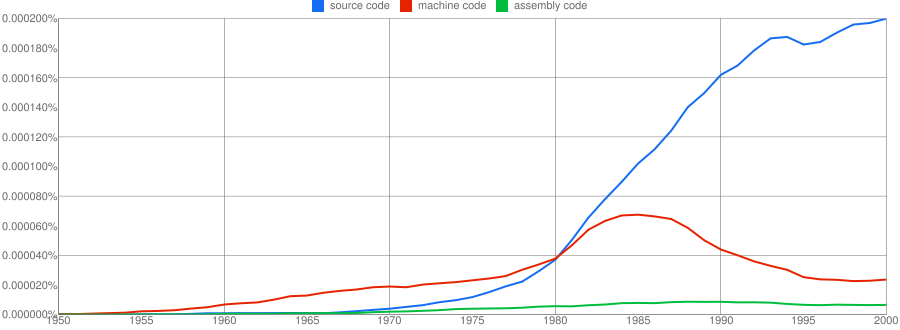
Computer language popularity is a perennial question. Fortran and Cobol address very different markets and I would have expected their usage to follow similar patterns, with “COBOL” having the obvious usage pattern for them both to follow. Instead, both “FORTRAN” and “Fortran” peaked within 10 years, with one staying there for another 20 years before declining and the other still going strong in 2000 (and still ahead of “PHP” and “Python” in 2000; neither shown to keep the clutter down). I am surprised to see “Prolog” usage being so much greater than “Lisp” and I would have expected “Lisp” to have a stronger presence in the 1970s.
I think the C++ crowd will be surprised to see that in 2000 usage was not much greater than what “FORTRAN” had enjoyed for 20 years.
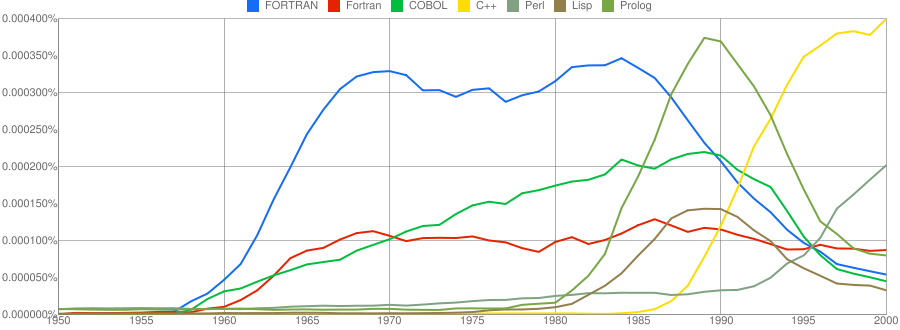
“C”, as in language, usage is obviously different to reliably measure. I have tried the obvious bigrams. Looking at some of the book matches for the phrase “in C” shows that the OCR process has sometimes inserted spaces that probably did not exist in the original, the effect being to split words and create incorrect bigrams. The phrase “in C” would also appear in books on music.
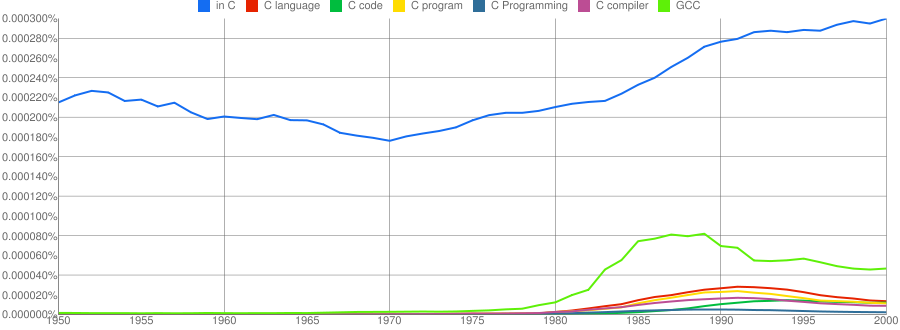
I have put the three words “Java”/”SQL”/”BASIC” in a separate plot because their usage swamps that of the other languages. Java obviously has multiple non-computer related uses and subtracting the estimated background usage suggests a language usage similar to that of “SQL”. There is too much noise for the usage of “Basic” to tell us much.
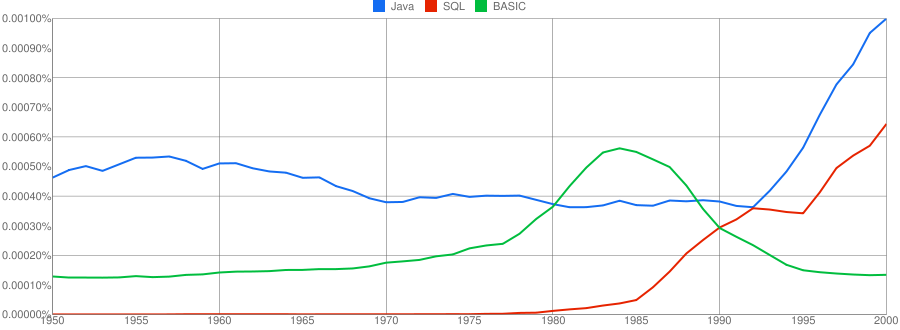
One way of comparing C/C++ language usage is to look source code usage where they are likely to differ. I/O, in the form of printf/scanf and stdio/iostream, is one obvious choice and while the expected C usage starts to declines in the 1990s the C++ usage just shows a stead growth (perhaps the <</>> usage, which does not appear in the Google viewer, has a dramatic growth during this time period).
Surprisingly #define also follows a similar pattern of decline. Even allowing for the rabid anti-macro rhetoric of the C++ in-crowd I would not have expected such a rapid decline. Perhaps this is some artifact of the book selection process used by Google; but then "namespace" shows a healthy growth around this time period.
The growth of "inline" over such a long period of time is a mystery. Perhaps some of this usage does not relate to a keyword appearing within source code examples but to text along the lines of "put this inline to make it faster".
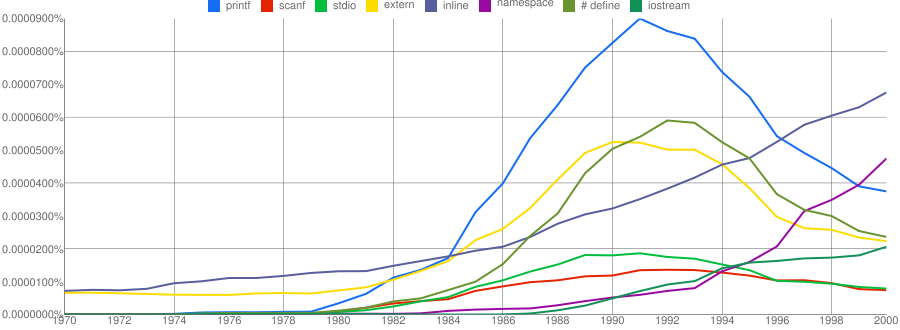
What usage should we expect for the last decade? A greater usage of "PHP" and "Python" is an obvious call to make, along with the continuing growth of SQL, I think "UML" will also feature prominently. Will "C++" show a decline in favor or "Java" and what about "C#"? We will have to wait and see.
Recent Comments